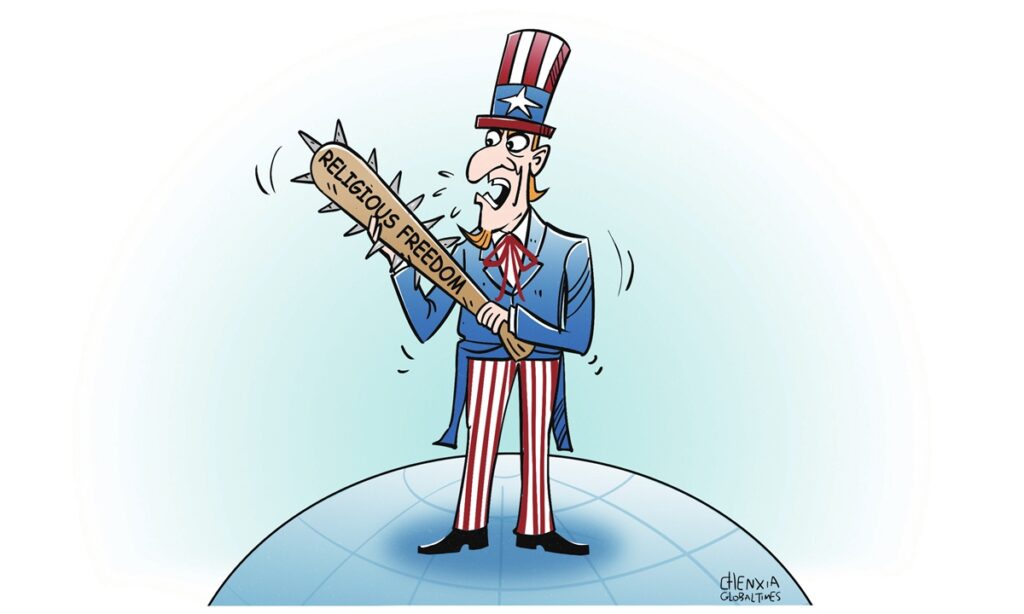The US Department of State released the 2023 International Religious Freedom Report on Wednesday. This is the 25th International Religious Freedom Report issued by the US since 1999. As always, the US has singled out some countries for special attention and observation, with the actual intention of naming and shaming or even slandering them in the international community, once again exposing the hegemonic logic of US-style human rights.
The US “concern” for Muslim human rights is actually based on ideology and national interests. On the one hand, the US government has loudly proclaimed its “humanitarian aid” to Palestinian civilians, such as US Secretary of State Antony Blinken recently stating during a visit to the Middle East that the US will provide $404 million in humanitarian aid to Palestinian civilians in the Gaza Strip, the West Bank and surrounding regions, in order to shape its own “glorious” and “noble” international human rights image.
On the other hand, since the outbreak of new conflicts between Israel and Palestine last October, the US government has increased military forces in the Middle East and provided large amounts of military aid. On top of this, it has also repeatedly obstructed UN Security Council resolutions on the situation in Israel and Palestine, undermining international efforts to promote peace between the two sides.
In fact, the long-standing support of its allies by the US government is the fundamental reason why the Palestinian issue has remained unresolved for decades. The human rights harms, such as deprivation of life, health damage, rape, forced disappearances, and displacement, are incalculable. The US’ double-standard human rights policy has also had a significant impact on American society, with the human rights situation of US Muslims substantially deteriorating in recent times. The effects of the Muslim ban issued by former president Donald Trump are still felt today, with “Islamophobia” continuously leading to violent activities and hate crimes against American Muslims. A 2024 survey by the Pew Research Center shows that 70 percent of American Muslims believe that discrimination against Muslims has increased since the start of the Israel-Hamas war, and 53 percent say that news about the war makes them feel afraid.
The US selectively ignores the actions of its allies in Gaza, yet criticizes China for “genocide” and “crimes against humanity” in this year’s Report on International Religious Freedom, following the same hegemonic logic. These accusations go beyond taking the moral high ground of international legal norms. They reflect the US’ narrow-minded perspective – such phenomena are part of the historical memory of many Americans within the US’ short 200-year history. These labels also demonstrate the US’ selective use of human rights as a tool based on national power and interests.
In essence, hegemonism is ultimately reduced by the US to an “ally-enemy” political framework: there exists a substantive relationship of subjugation between the hegemonic state the US, as the dominant force, and its “follower states” as the subjugated entities. The so-called ally status is largely obtained through this subjugation. Outside the hegemonic state’s sphere of influence, all “others” constitute real or potential enemies. For these “others,” the logic of hegemonism is to eliminate them or convert them into “allies” within its capacity, more accurately, convert them into appendages, thus becoming part of its own national system. Consequently, the theoretical logic of American-style human rights, when applied to international practices, results in interventionist homogenization based on its own logic toward other countries. Under the logic of hegemonism, American-style human rights are inherently instrumental, ultimately serving to maintain and strengthen the US’ global hegemonic position.
The essence of US-style human rights lies in “hegemonism.” “Human rights are above sovereignty” uses the universality of morality to suppress the particularity of politics and laws, thus providing moral justification for “humanitarian” intervention. Behind this theory, not only are “human rights” standards set by hegemonic countries, but their moral basis is also assumed to be legitimate and universal. “Humanitarian” intervention based on the economic, military and political advantages of a hegemonic country naturally takes the moral high ground, so that hegemonic powers can intervene in other countries under the cover of “humanitarianism.”
The widespread discrimination against ethnic minorities in the US and the crimes committed by the US in the Middle East and other regions that seriously violated the sovereignty and human rights of other countries not only expose the hypocrisy of US discourses, but also constitute an irony on the role of the US as the world’s sole “human rights policeman.” Ultimately, the US-style human rights exist in a paradoxical way: there is a deviation between the US’ human rights discourse and human rights practice.
The international community is well aware of the hegemonic logic behind the US’ human rights narrative. Although the US has repeatedly played the cards of religion and human rights, as the logic of the US’ human rights hegemony further unfolds, it will only pull itself down step by step from the altar of “human rights.”
The author is deputy head of the Human Rights Institute at the Southwest University of Political Science and Law. opinion@globaltimes.com.cn
